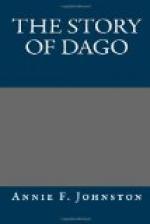The doctor turned us all out of the room, and I waited with the boys out by the alley-gate until he came down-stairs and told us how badly Phil was burned. His front hair and eyebrows and beautiful long curly lashes were singed off, and his face was so full of powder that it was as speckled as a turkey egg. The grains would have to be picked out one by one,—a slow and painful proceeding. The doctor could not tell how badly his eyes were hurt until next day, but thought he would have to lie in a dark room for a week at least, with his eyelids covered with cotton that had been dipped in some soothing kind of medicine.
But that week went by, and many a long tiresome day besides, before Phil could use his eyes again. They would not let me go into the room that first day, but after Phil had gone to sleep I hid under a chair in the upper hall, where Miss Patricia and the doctor were talking. “Tom,” said Miss Patricia, “what do you suppose made that child do such a reckless thing? Sometimes I think that boys are like monkeys, and are possessed by the same spirit of mischief. Neither seem satisfied unless they are playing tricks or making some kind of a disturbance. They are always getting into trouble.”
“Yes, it does seem so,” answered the doctor, “but if we could look down to the bottom of a boy’s heart, we would find that very little of the mischief that he gets into is planned for the purpose of making trouble. He does things from a pure love of fun, or from some sudden impulse, and because he never stops to think of what it may lead to. Phil never stopped to think any more than Dago would have done, what would be the result of setting fire to the powder. You must remember that he is a very little fellow, Aunt Patricia. He is only eight. We shouldn’t expect him to have the reasoning powers of a man, and the caution and judgment that come with age.”
Now I thought that that was a very sensible speech. It seemed to excuse some of my own past mistakes. But Miss Patricia put on her old war-eagle look.
“Really, Tom,” she said, “that sounds very well, but it is not what was taught in my day. A wholesome use of the rod after the first act of disobedience helps boys to stop and think before committing the second. It is a great developer of judgment, in my opinion. If you had punished Phil the first time he took down his grandfather’s powder-horn after you had forbidden him to touch it, he would never have taken it down the second time, and so would have been spared all this suffering to-day.”
“I know you are right, Aunt Patricia,” said the doctor, “but I seem to remember my own boyhood so clearly, the way I thought and felt and looked at things, that I have a very warm sympathy for my little lads when they go wrong.”
Miss Patricia rose to go down and prepare the lemon jelly that Phil had asked for, saying, as she moved toward the stairs:




